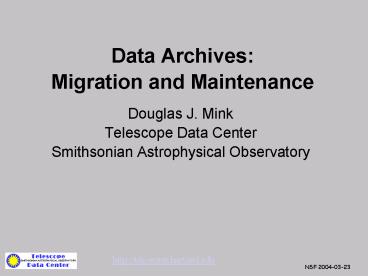Data Archives: Migration and Maintenance - PowerPoint PPT Presentation
Title:
Data Archives: Migration and Maintenance
Description:
Data Archives: Migration and Maintenance. Douglas J. Mink. Telescope Data Center ... One or few Data Center(s)? Many Data Centers reachable through few Portals ... – PowerPoint PPT presentation
Number of Views:25
Avg rating:3.0/5.0
Title: Data Archives: Migration and Maintenance
1
Data ArchivesMigration and Maintenance
- Douglas J. Mink
- Telescope Data Center
- Smithsonian Astrophysical Observatory
http//tdc-www.harvard.edu
NSF 2004-03-23
2
Archiving Issues
What do we save? Reduced Data? Raw
Data? Calibration data? Data
Products? Publications? How do we access
the data? Google Search? (ADS) Through
discipline Portal(s)? (VO registries) Through
Data Center? Where does the data live? One or
few Data Center(s)? Many Data Centers reachable
through few Portals Number of Centers is
limited by long-term funding
NSF 2004-03-23
3
Migration Issues
Why do we migrate archives? Better access,
Cheaper storage, more compact storage What do we
migrate from an archive? Everything? Reduced
Data only? Data Products? What do we do
with the old media? Paper and glass are more
stable than digital media! Magnetic tapes may be
more stable than optical disks! Who pays? Is
migration maintenance? Is a new, more useful
archive being created?
NSF 2004-03-23
4
Maintenance Issues
What are the costs? Space, Staffing Equipmen
t maintenance and repair Backup protection? What
is the safest way to back up a multi-Terabyte
archive? Cloning to other sites improves access
as well as providing backup How do we maintain
old media? Old media may be more stable over time
than new media! Can we maintain older, less
compact data?
NSF 2004-03-23
5
Some US Astronomical Archives
Online (All NASA Funded) Hubble Space Telescope
17.6 Terabytes Two-Micron All-Sky Survey 5
Terabytes Sloane Digital Sky Survey 1
Terabyte online (50 more offline) Palomar-QUEST
6 Terabytes (1/month since
9/2003) Off-Line NOAO Save-the-Bits 44.4
Terabytes (7.6 Terabytes/year) HPSSP (Harvard
Plate Stack Scanning Project) 200
Terabytes Future LSST (Large Scale Synoptic
Array) 7 Terabytes per night!
NSF 2004-03-23
6
Growing Astronomical Catalogs
- 1989 HST Guide Star Catalog 25,541,952 sources
- 1996 USNO-A1.0 Catalog 488,006,860 sources
- 1998 USNO-A2.0 Catalog 526,280,881 sources
- 2001 GSC II Catalog (2.2.01) 998,402,801
sources - 2002 USNO-B1.0 Catalog 1,036,366,767 sources
NSF 2004-03-23
7
Virtual Observatory Portals
US ADS (links from publications) Goddard
(Skyview vizualization) JHU,NCSA,Caltech (VO
Registry modelling) IPAC (IRSA, etc.)
SAO WCSTools (desktop catalog access) England
The Grid France CDS (Aladin/Vizier/Simbad)
NSF 2004-03-23
8
International Virtual Observatory Alliance (IVOA)
Registries Searchable databases containing
descriptions of data available in the Virtual
Observatory Data Model Standards for data
format and content VOTable XML transfer format
for metadata UCD Uniform Column Descriptors (so
everyone doesn't make up their own names for the
same things) Data Access Layer (DAL) User
interface Protocols Open interfaces to large
archives ease multi-level links (NSF funds US
participation in IVOA)
NSF 2004-03-23
9
(No Transcript)
10
Migrating Harvard's Astronomical Plate
Collection from Paper and Glass to Bits
- 500,000 glass plates covering the entire sky
from 1885-1989 - Basis for fundamental discoveries in astronomy,
such as using Cepheid variable stars as cosmic
yardsticks - A legacy of long-term commitment to
astronomical photography and research - Astronomy will not have an equivalent time frame
from digital observations until 2080.
CfA/PSSG, 2002-11-18
11
International Astronomical Union Resolution B3,
2000Safeguarding the Information in Photographic
Observations
- The International Astronomical Union,
- Recognising
- that unless urgent action is taken, this unique
historical record of astronomical phenomena will
be lost to future generations of astronomers, - Recommends
- the transfer of the historic observations onto
modern media by digital techniques, which will
provide worldwide access to the data so as to
benefit astronomical research in a way that is
well matched to the tools of the researcher in
the future.
CfA/PSSG, 2002-11-18
12
Step 0 List what is in the archive(on the web)
NSF 2004-0323
13
Typical large glass plate
NSF 2004-03-23
14
First Digitize Metadata
- From hand-written cards and logbooks
NSF 2004-03-23
15
Digital access to plate metadata(interactive web
page)
NSF 2004-02-23
16
Results of metadata search
NSF 2004-02-23
17
Next Digital access to image data
- Move the plates out of the 20th century
NSF 2004-03-23
18
Proposed access to digital images
Object or coordinates and time
Stack Catalog search
User
Plate names and object (x,y)
FITS extractor
FITS imagesof plate portions
FITS or Tiff Image Archive (100 Terabyte)
FITS Header Archive (WCS information)
NSF 2004-03-23































